By Jonathan Pacheco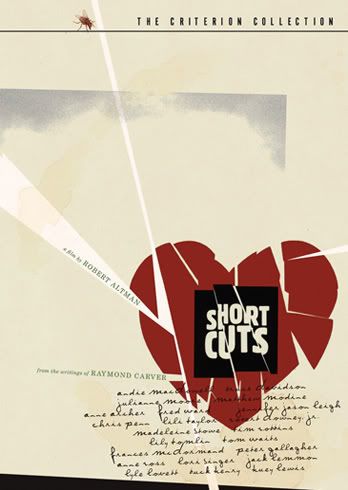 For nearly a decade, I've felt a certain allegiance to Robert Altman's Short Cuts, and I'd never seen a single frame of it. It was always known as a "big sister" to the sprawling ensemble films that I became obsessed with in the late 90s; if I loved movies like Magnolia so much, then there's no doubt that Altman's opus must've been exceptional. I took this allegiance so far as to chide anyone who would praise any new "tapestry film" with interlocking stories because, if they knew anything, they'd know that Short Cuts did it first.
For nearly a decade, I've felt a certain allegiance to Robert Altman's Short Cuts, and I'd never seen a single frame of it. It was always known as a "big sister" to the sprawling ensemble films that I became obsessed with in the late 90s; if I loved movies like Magnolia so much, then there's no doubt that Altman's opus must've been exceptional. I took this allegiance so far as to chide anyone who would praise any new "tapestry film" with interlocking stories because, if they knew anything, they'd know that Short Cuts did it first.
Now, finally, I've met the "big sister."
As Altman has put it, Short Cuts is not necessarily a group of stories, but rather a group of occurrences. It lifts the roofs off houses and peeks in on the conversations. And it's not what the characters are doing that's important, it's the fact that they are doing it (and why and how). The film is not concerned with plot, but with people; the rest will take care of itself. It's a risky approach, and even Altman himself isn't always successful with the method—The Company took a similar tack with a smaller cast and more plot, and it didn't work as well as it should have. But it works in Short Cuts.
One thing that separates Short Cuts from the likes of Magnolia, and which separates most Altman films from the pack, is its unbiased exterior. No melodramatic violin cues are used to manipulate your feelings one way or another. Occurrences and emotions are simply placed in front of you for you to see and experience for yourself. Everything feels very matter-of-fact, and this, coupled with the film's humor, makes Short Cuts seem "light." Yet the objective nature of Altman's directing allows for so many subtleties to brew under the surface, so while the film may play as very funny and relatively happy upon initial viewings, you soon realize that, in a multitude of ways, it's actually a very dark film, laced with tragedy.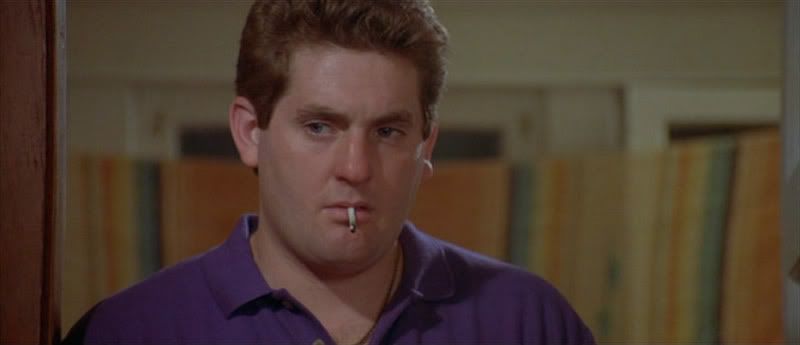 That's apparent in certain story threads, such as that of the Finnigan family (Andie MacDowell and Bruce Davison), whose child (Zane Cassidy) is struck by a car and survives, only to later die in the hospital. Yet I find the story of the Kaisers to be the most heartbreaking. Jerry (played by the late Chris Penn, who seems an older version of Jonah Hill) is a pool cleaner whose wife Lois (Jennifer Jason Leigh) helps make ends meet as a phone sex operator working from home. Some of Short Cuts' funniest moments come from the shock of seeing her character say some terribly provocative things on the phone while changing her baby's diaper. Through all this, Jerry begins to experience jealousy, confusion, and so many other emotions that he doesn't know what to do with. At one point he asks Lois why she doesn't talk to him the way she does to the guys who call in. Her response shows that she is completely oblivious to her husband's emotions. To her, sex is either part of a job that pays good enough money, or something so mechanical that she's really only going through the motions. I doubt that she feels that she's being unfaithful in any way—it's just that meaningful passionate sex is of no interest to her at this point. Perhaps it's because she talks about it and fakes it all day long. Or sometimes there are just people who for one reason or another are not that "into it." Regardless, Jerry still wants something that halfway resembles what his wife gives to the strangers that call in. He feels he shouldn't be jealous, and that he probably shouldn't want the type of "dirty talk" that his wife provides; but why, then, does he feel this way? Why does it eat at him? He's too mixed up and frustrated to sort out the ways in which he feels about the situation, and eventually, this spurs him on to commit a shocking act of violence. As disturbing as the bloody outcome of his story is, simply seeing Jerry struggle internally, trying not to feel the way he feels, is the most tragic part.
That's apparent in certain story threads, such as that of the Finnigan family (Andie MacDowell and Bruce Davison), whose child (Zane Cassidy) is struck by a car and survives, only to later die in the hospital. Yet I find the story of the Kaisers to be the most heartbreaking. Jerry (played by the late Chris Penn, who seems an older version of Jonah Hill) is a pool cleaner whose wife Lois (Jennifer Jason Leigh) helps make ends meet as a phone sex operator working from home. Some of Short Cuts' funniest moments come from the shock of seeing her character say some terribly provocative things on the phone while changing her baby's diaper. Through all this, Jerry begins to experience jealousy, confusion, and so many other emotions that he doesn't know what to do with. At one point he asks Lois why she doesn't talk to him the way she does to the guys who call in. Her response shows that she is completely oblivious to her husband's emotions. To her, sex is either part of a job that pays good enough money, or something so mechanical that she's really only going through the motions. I doubt that she feels that she's being unfaithful in any way—it's just that meaningful passionate sex is of no interest to her at this point. Perhaps it's because she talks about it and fakes it all day long. Or sometimes there are just people who for one reason or another are not that "into it." Regardless, Jerry still wants something that halfway resembles what his wife gives to the strangers that call in. He feels he shouldn't be jealous, and that he probably shouldn't want the type of "dirty talk" that his wife provides; but why, then, does he feel this way? Why does it eat at him? He's too mixed up and frustrated to sort out the ways in which he feels about the situation, and eventually, this spurs him on to commit a shocking act of violence. As disturbing as the bloody outcome of his story is, simply seeing Jerry struggle internally, trying not to feel the way he feels, is the most tragic part.
The beauty of Short Cuts is that most of its characters' conflicts aren't said or revealed. The majority of Penn's acting comes through silent expression, and that is one of the goals of Short Cuts: to force the viewer to fill in some of the blanks. As it is with Carver's short stories, it's not what you know, but rather what you remain in the dark about. Possibly more so than in other films, Short Cuts can be understood and interpreted in as many ways as there are people in the world.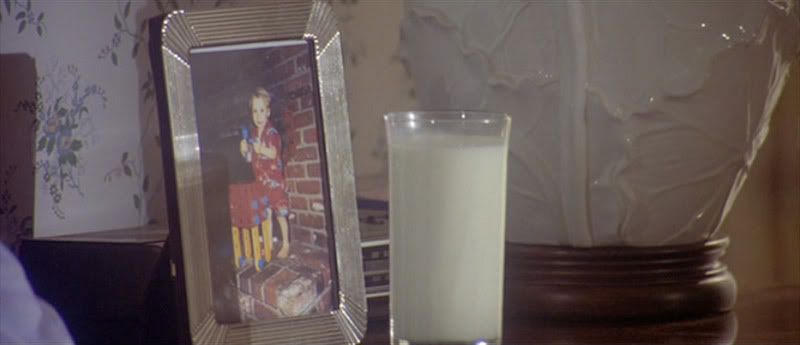 Visually, this film is vintage Altman. Zooms are an under-discussed element of cinema—a zoom in one filmmaker's hands is cheesy, out of place, and inexplicable, but in the hands of someone like Altman, even the snappiest of zooms is personal, elegant, and evocative. There's something very old-school about the way he uses them. Even a respected director like Wes Anderson seems to wink at the audience with every long zoom, yet with older filmmakers like Altman or Woody Allen, something as mundane as a quick zoom into a glass of milk seems so much more sincere.
Visually, this film is vintage Altman. Zooms are an under-discussed element of cinema—a zoom in one filmmaker's hands is cheesy, out of place, and inexplicable, but in the hands of someone like Altman, even the snappiest of zooms is personal, elegant, and evocative. There's something very old-school about the way he uses them. Even a respected director like Wes Anderson seems to wink at the audience with every long zoom, yet with older filmmakers like Altman or Woody Allen, something as mundane as a quick zoom into a glass of milk seems so much more sincere.
I think this is partially why Altman's films tend to look older than they really are. Short Cuts may have been made in the early 90s, but its aesthetic quality and style at times feels straight out of the 70s. In an age with too many steadicam or other fancy shots, zooms seem kind of outdated, but Altman always held on to them, at times putting the slickest dolly shot to shame with his zoom lens. But even his more recent films like Cookie's Fortune have an older feel because of this, and it's really not until the new millennium that Altman's pictures feel more visually "modern." Yet up until and including his final film, the gorgeously photographed A Prairie Home Companion, the zooms remained, and they were just as good as they were in M*A*S*H.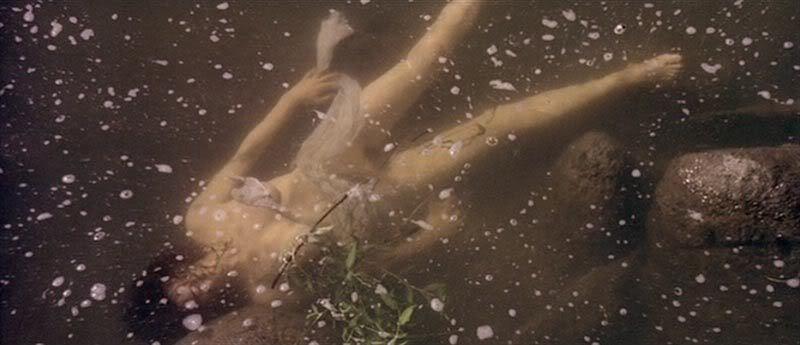 Short Cuts is about randomness. Not "random" in the sense that Magnolia connects its characters and not "random" in the way that Crash's protagonists supposedly meet by coincidence. This is chance without prejudice or agenda. It's what helps to put across the film's unbiased feel. Even the earthquake at the end of Short Cuts is an example of this. Some feel that it is a way to tie the stories together, but I never get that sense. It's sort of the ultimate capper to the randomness: earthquakes simply happen.
Short Cuts is about randomness. Not "random" in the sense that Magnolia connects its characters and not "random" in the way that Crash's protagonists supposedly meet by coincidence. This is chance without prejudice or agenda. It's what helps to put across the film's unbiased feel. Even the earthquake at the end of Short Cuts is an example of this. Some feel that it is a way to tie the stories together, but I never get that sense. It's sort of the ultimate capper to the randomness: earthquakes simply happen.
Because of chance, some characters are lucky and some are unlucky. Altman asserts, more or less, that they're the same thing. One person can win the lottery and another person across the globe gets killed at the same time by a falling icicle; good or bad, it's all the same. It's all chance. Looking at the stories of Short Cuts, we see this same randomness, and it's something that the characters must learn to come to grips with. In the story of the Finnigans, we see a family that is very well off. A family that does everything the right way and the safe way, yet it's their child who is struck by the vehicle. It's their child that dies. They think, "Why? Why us?" But why not? What they have to come to realize is that there is no "why." There is no reason why their son died, just as there is no real reason why the two-timing cop (Tim Robbins) ends the film with a happy family. Their lives, according to Altman, and Carver (in a way), are just random.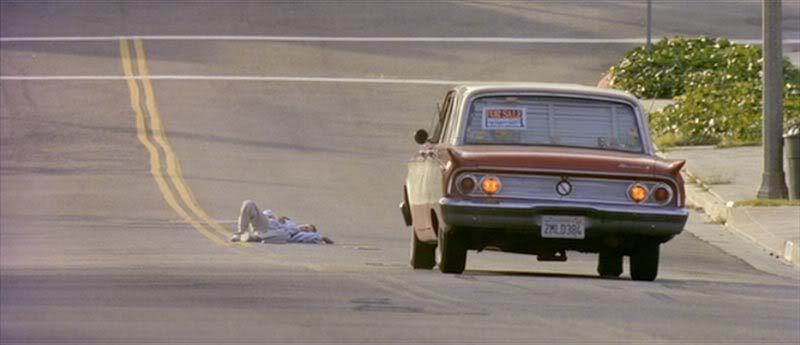 Relatively speaking, the story of Honey and Bill Bush (Lili Taylor and Robert Downey, Jr.), the couple watching the apartment of traveling neighbors, is the weakest thread of Short Cuts. It's not a bad storyline, but it lacks some of the subtext that is found in other parts of the film. The more disappointing part is that the Carver short story that this segment is based on is actually quite good. I realize that Altman is in no way trying to deliver a pure and literal adaptation of Carver's works, but the original piece has more emotional involvement. In both pieces, the couple become obsessed with their neighbor's home and how it makes them feel to occupy it, yet in the short story there is a specific sense of desperation. There are signs of something deeper than just mere fascination on the couple's part. The film doesn't explore this; unfortunately, it doesn't feel like it explores much of anything with the storyline.
Relatively speaking, the story of Honey and Bill Bush (Lili Taylor and Robert Downey, Jr.), the couple watching the apartment of traveling neighbors, is the weakest thread of Short Cuts. It's not a bad storyline, but it lacks some of the subtext that is found in other parts of the film. The more disappointing part is that the Carver short story that this segment is based on is actually quite good. I realize that Altman is in no way trying to deliver a pure and literal adaptation of Carver's works, but the original piece has more emotional involvement. In both pieces, the couple become obsessed with their neighbor's home and how it makes them feel to occupy it, yet in the short story there is a specific sense of desperation. There are signs of something deeper than just mere fascination on the couple's part. The film doesn't explore this; unfortunately, it doesn't feel like it explores much of anything with the storyline.
It's difficult to do justice to the film's various threads because there are so many facets to each of them. But reflecting on Short Cuts, I dwell more on certain moments and fragments: Earl (Tom Waits) and Doreen (Lily Tomlin), happy once again in their trailer, but for how long? Gene, the cop and sleazeball, standing as a hero to his family, his wife in his arms. The baker (Lyle Lovett) offering muffins to the Finnigans. The reveal of the dead body during the fishing trip. Jack Lemmon, as Howard Finnigan's estranged father, delivering a beautiful confessional monologue. Jerry's face as he listens to his wife perform her job. These moments and so many more serve as fragments and pieces of a brilliant whole. It's fitting that the Criterion Collection DVD of Short Cuts features a shared motif on its cover and its menus of a heart shattered into fragments. They're broken pieces, yes, but they still form a heart. Images/Sound/Extras: Compiled into a tight little book are the nine Raymond Carver short stories and single poem that provided the tales for Short Cuts. With a brief but informative foreword by Robert Altman, it's easy to see the connection between the filmmaker and Carver. These stories are spare in language and in story elements, only giving you just enough to draw your own conclusions. It's easy to appreciate both artists' ability to reveal the most private moments of the everyman. I've heard people describe Carver's prose as "poetic," but when I read them, I didn't think so. On the contrary, the language is very straightforward and at times mundane, but then I realized that it's not the language that's poetic, it's the story itself.
Images/Sound/Extras: Compiled into a tight little book are the nine Raymond Carver short stories and single poem that provided the tales for Short Cuts. With a brief but informative foreword by Robert Altman, it's easy to see the connection between the filmmaker and Carver. These stories are spare in language and in story elements, only giving you just enough to draw your own conclusions. It's easy to appreciate both artists' ability to reveal the most private moments of the everyman. I've heard people describe Carver's prose as "poetic," but when I read them, I didn't think so. On the contrary, the language is very straightforward and at times mundane, but then I realized that it's not the language that's poetic, it's the story itself.
As is to be expected, Altman's movie has its share of grain and the occasional film jitter, but a good job is done eliminating every other visual nuisance. The DVD also features a couple of disappointing deleted scenes (too short) and the usual trailers and TV spots, along with a nice archive of poster mock-ups that were part of a preliminary marketing campaign. There's also a lengthy look at Carver's life via a PBS documentary, as well as an audio interview with the late writer. He's more down-to-earth than I would have expected, but he never short-changes himself either; he knew when he did good work, and he is happy to discuss it. The one piece that's made specifically for the Criterion disc is a reflective half-hour conversation between Tim Robbins and Robert Altman. It features several good insights from both the actor and director, not only on making Short Cuts, but how they interpret the film when they watch it now.
Luck, Trust and Ketchup is a feature-length documentary on the making of the film (some video glitches at the bottom of the picture lead me to believe that the source material was transferred from tape). It's decent enough as a documentary, with some informative interviews from Carver's widow, some of the film's actors, and Altman himself, though most of the filmmaker's insights are found almost verbatim in the short stories' foreword. The real reason to see the feature is for the clips of Altman as he directs. It's one thing to read about the director's process or to hear him speak on it, but it's totally another thing to see the man in action. There are times when he's very specific about what he wants and there are times where he merely sits back, chuckling his head off at a scene, and turning to the documentarian's camera as if to say, "You getting this?"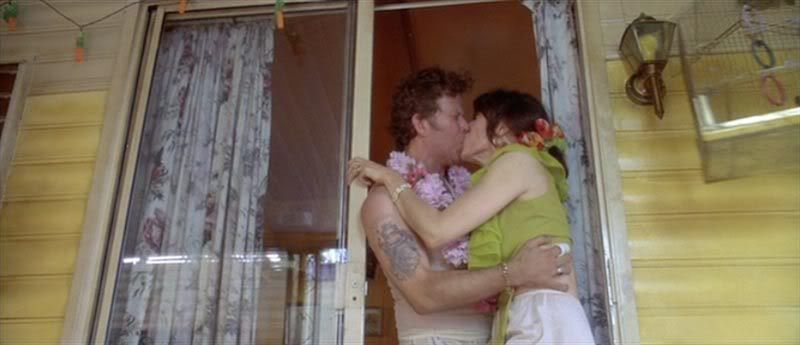 ___________________________________________________
___________________________________________________
Jonathan Pacheco is a current web developer and future freelance writer. He blogs and reviews films at Bohemian Cinema.
Thursday, March 1, 2007
The Criterion Collection #265: Short Cuts
Subscribe to:
Comments (Atom)